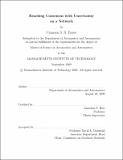Reaching Consensus with uncertainty on a network
Author(s)
Fraser, Cameron S. R
DownloadFull printable version (9.405Mb)
Other Contributors
Massachusetts Institute of Technology. Dept. of Aeronautics and Astronautics.
Advisor
Jonathan P. How.
Terms of use
Metadata
Show full item recordAbstract
As modern communication networks become increasingly advanced, so does the ability and necessity to communicate to make more informed decisions. However, communication alone is not sucient; the method by which information is incorporated and used to make the decision is of critical importance. This thesis develops a novel distributed agreement protocol that allows multiple agents to agree upon a parameter vector particularly when each agent has a unique measure of possibly non-Gaussian uncertainty in its estimate. The proposed hyperpa- rameter consensus algorithm builds upon foundations in both the consensus and data fusion communities by applying Bayesian probability theory to the agreement problem. Unique to this approach is the ability to converge to the centralized Bayesian parameter estimate of non-Gaussian distributed variables over arbitrary, strongly connected networks and without the burden of the often prohibitively complex lters used in traditional data fusion solutions. Convergence properties are demonstrated for local estimates described by a number of common probability distributions and over a range of networks. The benet of the proposed method in distributed estimation is shown through its application to a multi-agent reinforcement learning problem. Additionally, this thesis describes the hardware implementation and testing of a distributed coordinated search, acquisition and track algorithm, which is shown to capably handle the con icting goals of searching and tracking. However, it is sensitive to the estimated target noise characteristics and assumes consistent search maps across the fleet. (cont.) Two improvements are presented to correct these issues: an adaptive tracking algorithm which improves the condence of target re-acquisition in periodic tracking scenarios, and a method to combine disjoint probabilistic search maps using the hyperparameter consensus algorithm to obtain the proper centralized search map.
Description
Thesis (S.M.)--Massachusetts Institute of Technology, Dept. of Aeronautics and Astronautics, 2009. This electronic version was submitted by the student author. The certified thesis is available in the Institute Archives and Special Collections. Cataloged from student submitted PDF version of thesis. Includes bibliographical references (p. 189-197).
Date issued
2009Department
Massachusetts Institute of Technology. Department of Aeronautics and AstronauticsPublisher
Massachusetts Institute of Technology
Keywords
Aeronautics and Astronautics.